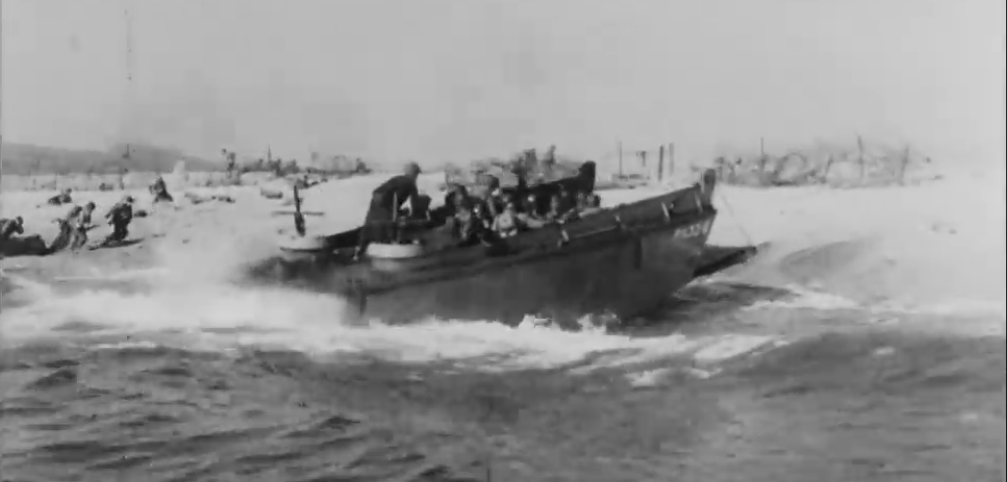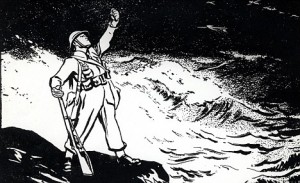
D-Day +79: “Rough Men Stand Ready,” a Shared Sentiment
Excerpted from “’Rough Men Stand Ready’: Neither Churchill nor Orwell,” written for the Hillsdale College Churchill Project. For the original article with endnotes, click here. To subscribe to weekly articles from Hillsdale-Churchill, click here, scroll to bottom, and fill in your email in the box entitled “Stay in touch with us.” Your email address is never given out and remains a riddle wrapped in a mystery inside an enigma.
Q: D-Day remembrance: Rough men stood ready….
“People sleep peaceably in their beds at night because rough men stand ready to do violence on their behalf.” Is this something Churchill said? I see it frequently credited to him. Another version reads: “We sleep soundly in our beds because rough men stand ready in the night to visit violence on those who would do us harm.” —L.K., Dallas
A: Not Churchill, not Orwell
Churchill would have approved of the sentiment, but it is not possible to attribute this phrase to him through our digital scans of 80 million words by and about WSC. It is also often assigned to George Orwell, but hasn’t been reliably tracked to him, either. He did, however, write something similar.
Reader Steve Brantley referred us to Orwell’s 1945 article, “Notes on Nationalism.” Here Orwell writes that pacifists cannot accept the statement, “Those who ‘abjure’ violence can do so only because others are committing violence on their behalf.” Nevertheless, Orwell added, the truth of the thing was “grossly obvious.”
Reader Tom Kovatch furthered the search by advising us that the “rough men” quote might be “Orwellian Drift.” As with “Churchillian Drift,” these are words placed in a famous person’s mouth to make them more interesting. That led us to Quote Investigator, an outstanding website which tracks quotations and exposes fake attributions.
Churchill to Orwell to Kipling
Quote Investigator offers a page of explanation tracking the Rough Men quote to a 1993 Washington Times column by film critic and essayist Richard Grenier: “As George Orwell pointed out, people sleep peacefully in their beds at night only because rough men stand ready to do violence on their behalf.” Of course, Orwell no more than Churchill ever said precisely that.
But Quote Investigator digs deeper, coming up with a parallel sentiment by Rudyard Kipling, in his 1890 poem “Tommy”:
O makin’ mock o’ uniforms that guard you while you sleep
Is cheaper than them uniforms, an’ they’re starvation cheap…
Orwell, Quote Investigator tells us, referred to that poem in 1943:
A humanitarian is always a hypocrite, and Kipling’s understanding of this is perhaps the central secret of his power to create telling phrases. It would be difficult to hit off the one-eyed pacifism of the English in fewer words than in the phrase, “making mock of uniforms that guard you while you sleep.”

Quote Investigator provides a vast subtext to the various appearances and credits of “Rough men stand ready” over the years, to which we refer readers. Their conclusion is that no one specifically said the words, but Kipling may have inspired them. They are certainly in the Churchill spirit.
Shared Sentiments
While neither Churchill nor Orwell uttered the words, they held the same attitude toward the defense of liberty. As Andrew Roberts notes in his review of Thomas Ricks’s Churchill and Orwell: The Fight for Freedom:
Churchill and Orwell were both war correspondents, their prose styles partly conditioned by the urgent need to telegraph stories back from battlefields before being scooped by rivals. But it is very much in the political sphere that Ricks connects the two strangers—Churchill generally from the center-Right, Orwell from the Left—to make them what Simon Schama has called “the most unlikely of allies.”







One thought on “D-Day +79: “Rough Men Stand Ready,” a Shared Sentiment”
Nice piece. Good to see June 6th honoured at a time when it sometimes seems to be fading into the background of history. I was struck by the remarks from Quote Investigator regarding the hypocrisy of humanitarians and Kipling’s understanding of it. It’s not just the contempt paid to the “Universal Soldier” in time of peace—“making mock of uniforms that guard you while you sleep.” The mirror image is presented when Kipling shows us one of the mocked acknowledging that humanitarians have their place. “You’re a better man than I am, Gunga Din.” Some of Kipling’s early soldier work—both poetry and prose—can be hard going at first, as one adapts to the brogue, but the effort is repaid a hundredfold.
Comments are closed.